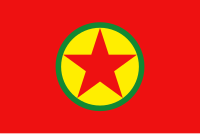PKK (Kurdistan Workers' party)
|
Kurdistan Workers' Party
Partiya Karkerên Kurdistanê (PKK) |
|
|---|---|
 |
|
| Leader | Cemîl Bayik and Murat Karayilan |
| Founded | 1978 |
| Headquarters | Qandil Mountains |
| Paramilitary wing |
People's Defence Forces (HPG) Free Women's Units (YJA-STAR) |
| Ideology |
Kurdish nationalism Libertarian socialism Communalism Secularism Feminism Jineology Democratic confederalism |
| National affiliation | Peoples' United Revolutionary Movement (HBDH) |
| International affiliation | Kurdistan Communities Union (KCK) |
| People's Defence Forces Hêzên Parastina Gel (HPG) |
|
|---|---|
 |
|
| Leader(s) | |
| Foundation | 1984 |
| Dates of operation | 1984–present |
| Motives | Cultural & political rights for the Kurdish population in Turkey. |
| Active region(s) | Turkey, Iraq, Syria, Iran |
| Ideology |
Libertarian socialism Democratic confederalism Communalism |
| Notable attacks |
1984 PKK attacks May 24, 1993 PKK ambush 2011 Hakkâri attack |
| Status | Fighting against ISIL. Ongoing war with Turkey, after ceasefire ended. |
| Size | Over 32,800 active fighters (2015 Turkish claim) |
| Website | www |
| Free Women's Units Yekîneyên Jinên Azad ên Star (YJA-STAR) |
|
|---|---|
 |
|
| Dates of operation | 1984–present |
| Active region(s) | Turkey, Iraq, Syria, Iran |
| Ideology |
Libertarian socialism Democratic confederalism Socialism Communalism |
| Status | Fighting against ISIL. Ongoing war with Turkey, after ceasefire ended. |
| Website | www |
The Kurdistan Workers' Party or PKK (Kurdish: Partiya Karkerên Kurdistanê) is an organization based in Turkey and Iraq. Since 1984 the PKK has been involved in an armed conflict with the Turkish state, with the initial aim of achieving an independent Kurdish state, later changing it to a demand for equal rights and Kurdish autonomy in Turkey.
The group was founded in 1978 in the village of Fis (near Lice) by a group of Kurdish students led by Abdullah Öcalan. The PKK's ideology was originally a fusion of revolutionary socialism and Kurdish nationalism, seeking the foundation of an independent, socialist state in the region, which was to be known as Kurdistan. The initial reason given by the PKK for this was the oppression of Kurds in Turkey. By then, the use of Kurdish language, dress, folklore, and names were banned in Kurdish-inhabited areas. The words "Kurds", "Kurdistan", or "Kurdish" were officially banned by the Turkish government. Following the military coup of 1980, the Kurdish language was officially prohibited in public and private life. Many who spoke, published, or sang in Kurdish were arrested and imprisoned. The PKK was then formed, as part of a growing discontent over the suppression of Turkey's ethnic Kurds, in an effort to establish linguistic, cultural, and political rights for Turkey's ethnic Kurdish minority.
Since the PKK's foundation, it has been involved in armed clashes with Turkish security forces. The full-scale insurgency, however, did not begin until 15 August 1984, when the PKK announced a Kurdish uprising. Since the conflict began, more than 40,000 have died, most of whom were Kurdish civilians. The European Court of Human Rights has condemned Turkey for thousands of human rights abuses. Many judgements are related to systematic executions of Kurdish civilians, torturing, forced displacements, destroyed villages,arbitrary arrests, murdered and disappeared Kurdish journalists, activists and politicians.
...
Wikipedia
